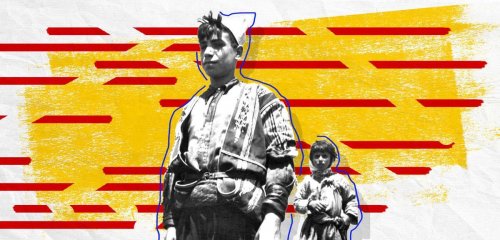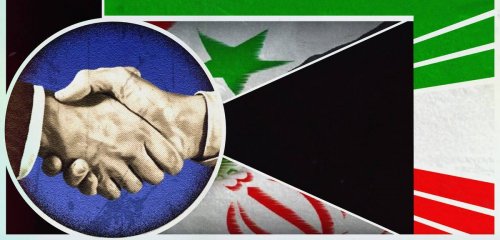Perhaps what distinguishes the Arab peoples – especially in this era – is their short memory. The Syrian people, in particular, may occupy advanced positions in terms of their short memory. Or maybe it is not short in reality, but it has been forced to be short because the majority of its brain cells (including memory) are preoccupied in daily conflicts, problems, and wars, whether military, political, or sectarian. The latest and harshest of these battles is the battle for making a living, as the salary, which now amounts to a maximum of about 15 US dollars, has forced the people in Syria, including the Alawites, to focus on securing their basic needs, pushing them back into primitive living conditions.
However, the collective memory of Syrian society, especially the Alawite memory, despite its shortness, has not forgotten the analogy that Syrian President Bashar al-Assad made in one of his speeches after the Israeli war on Lebanon in July 2006, in which he described Arab rulers as "pseudo-men" and went on to describe them as "oil and gas sheikhs" while dismissing their commitment to "democracy", "human rights", and "women's rights"!
In one of his speeches after the Israeli war on Lebanon in July 2006, Assad described Arab rulers as "pseudo-men"
In 2013, Syria's representative to the United Nations, Bashar Jaafari, criticized Saudi Arabia in a statement prior to the General Assembly's adoption of the resolution titled "The Human Rights Situation in Syria" proposed by Saudi Arabia. Jaafari said in a statement, "What is ironic and ridiculous is that the Saudi regime, which is known for its gross human rights violations against its own people, Muslims, and Arabs, and is the sponsor and main source of fundamentalist takfiri terrorism to all countries of the world, Arab capitals, and African coastal countries, is presenting a resolution calling for the protection of human rights for the Syrian people."
Then on May 18, 2023, Syrian Foreign Minister Faisal Mekdad, in statements to the Saudi News Channel, said, "I am happy to return... with the convening of the Arab summit on this pure land, the land of the Prophet of Islam and the land of Arabism. Saudi Arabia has made tremendous efforts to improve the Arab environment and embrace all Arab countries," ahead of Assad's own participation in the Arab summit that was later held in Jeddah.
From terrorism to unity
"When I heard the news of rapprochement with Saudi Arabia on one of the radio stations while I was tending to the sheep in a neighboring land, I remembered his speeches (referring to the president) about the House of Saud and them being pseudo-men. At that moment, I realized that we are the ones who have become pseudo-men, and I asked my nephew who was accompanying me (in tending the sheep), and he answered me: 'No, we have become 'pseudo-human beings', from lack of food and excessive work.' As soon as we are done with our official working hours, we go to our second job, and we think of finding a third job. I wonder, will this issue be raised in the Saudi-Syrian meetings?" says Safi, 49, a former natural science teacher and currently a laboratory supervisor at a school in rural Tartus, and then "a shepherd after official work hours", as he describes himself.
As for Hisham, 27, a young man studying information technology at Tishreen University in Latakia who keeps "failing himself" to escape being sent to compulsory service, he works on freelance programming projects with a Gulf company. He says, "They lied to us. One cannot begin to count the number of assessments and interviews with strategic analysts who used to appear on national media channels for hours, inciting people against the House of Saud and Wahhabism in Saudi Arabia and its role in smuggling terrorists into Syria and supporting them militarily and logistically. And in the end, they say, 'Saudi Arabia has changed its approach.' Since it has changed its approach, is there anyone who can bring back my brother, cousin, and cousin's son from under the ground?"
Syrian President Bashar al-Assad had said in an interview with Belarusian television in May 2017, "ISIS and al-Nusra share the same Wahhabi ideology, the same terrorist ideology. ISIS, al-Nusra, and Erdogan (the Turkish president), who is also a member of the Muslim Brotherhood, all share the same ideology, along with the Al Saud family and the Al Thani family in Qatar. All these groups are united by the extremist Wahhabi ideology. They are all tools in the hands of the United States."
"They lied to us. They used to incite people against the House of Saud and Wahhabism. Now they say 'Saudi Arabia has changed its approach.' Since it has changed its approach, is there anyone who can bring back my brother, cousin and cousin's son from death?"
Hisham also recalls a previous statement by Assad a few years ago when he was asked in an interview if it was possible to restore relations with countries that were hostile to Syria, such as Qatar, Saudi Arabia, and Turkey, after the war. Assad replied, "There are Syrian victims who fell because of these countries' support for terrorist groups, and I cannot decide for the people. So I will resort to asking them through a popular referendum." The young man continues, "Who was asked? Have we ever been asked about anything in this country?"
Interests above all
Rawad, a 33-year-old government employee in Latakia (who has not lost any relatives in the war), says his financial situation has reached rock bottom, especially since he is unable to find another job. Whatever salary he receives immediately becomes zero after deducting transportation expenses, food, and clothing. He says, "We have never been decision-makers as a people. We were deluded into thinking that we have the power to decision-making, and that we move by our own will. But the truth is that we are being manipulated. So we have no choice, neither to reject nor accept the Saudi-Syrian rapprochement. We need every Syrian pound so that we don't become even 'more miserable' than we already are."
Raed continues, "I don't want to talk about politics. Anyone who talks about it is foolish. Politics is a dirty world, where interests are above all, where people's wills are discarded and rot when leaders reach agreements, as Mahmoud Darwish says: 'Tomorrow, the wars will end and the leaders will shake hands, and that mother will remain waiting for her martyred son. I do not know who sold the homeland but I know who paid the price'. Destiny is the will of the major powers and the military, wrapped by the will and aspirations of the people, but it's a facade that quickly falls off."
In his opinion, if this rapprochement results in an increase of 100,000 Syrian pounds (about 13 US dollars) in salary, "I am in favor of it. We can't wait anymore; we are fed up."
The Alawites who supported Assad haven't forgotten his speeches and attacks against the Gulf rulers
Yasser, 49, an Alawite by birth (as he likes to describe himself), studied philosophy in France. He says, "Since coming to power, Bashar al-Assad has not presented himself as an Alawite president or a leader of a sect, contrary to what the majority of simple, ordinary Alawites saw. They understood that his lack of talk on sectarianism or his few visits at the beginning of his rule were 'political and religious piety', and that he wanted to be the president of all Syrians in appearance. As for the security and military apparatus, they operate according to a clear sectarian formula. But after the war, and after 2018 specifically, the Alawites (even the simpler and ordinary ones) began feeling a major rift between them and 'their Alawite president'. And I believe that what they understood as piety was, in fact, an evasion of his sectarian affiliation, as he wanted to portray himself as a Muslim only, fullstop."
Yasser has been living in the coastal countryside for decades, and he was only absent from his rural surroundings during those four years in France. He never heard that the president visited the well-known Alawite shrines or participated in Alawite religious rituals or in inner prayers. He says, "This rift became more evident to the majority of Alawites after the rapprochement with Saudi Arabia. Some felt betrayed after their children died in the war, while others became completely frustrated for a long time and no longer have any opinion or stance; they only want to feed their children."
The lie of "ending the suffering"
Commenting on Assad's speech at the Arab League summit on May 19th, and the repetition of the same vague and wooden rhetoric, along with the emphasis on what is known as "adherence to values and principles, while criticizing Western principles that produced all the medications, medical devices, technology, machines, laboratories, airplanes, etc." that he uses in his life, Hadi, 33, a Syrian-Lebanese who was born in Tripoli and obtained an economics degree from Tartus University, says, "When talking about Western values, we must remember that the GDP of the state of California alone exceeds the total GDP of all the Middle Eastern countries combined." He adds, "Religion, values, and principles are things that the poor entertain themselves with. They console themselves with them, while successful societies are preoccupied with the search for something new."
"After the war, and after 2018 specifically, the Alawites began feeling a major rift between them and 'their Alawite president'. And I believe that what they understood as piety was, in fact, an evasion of his sectarian affiliation"
Regarding the outcomes of the recent Arab summit, described by observers as "exceptional", Dr. Ratib Shabo, an Alawite writer, opposition figure, and political prisoner, writes on his personal Facebook page: "The Syrian regime has reached a point where it says, 'Don't teach me what I already know.' The draft statement of the Arab summit calls for 'ending the suffering of the Syrian people.' However, even this simple sentence is heavy on the ears of the Syrian regime, because it cannot escape the fact that this statement requires the regime to make a change that it is incapable of. It cannot reconcile the refugees or reach a settlement with the rest of the Syrian political forces. The Syrian regime has shrunk to fit the size of a divided Syria, deprived of millions of its people."
In conclusion, all of us Syrians were fuel for this war. Each of us relied on a side, and in the end, everyone abandoned us, and we were left alone struggling with what remained of our years of life. This is our message, the generation that lived through this war. Do not repeat us; in war, everyone is a loser. People die of hunger or wrapped in fake flags, and the chair remains as it is: without a flag, without belonging, and without identity, and is only concerned with its four lists.
Raseef22 is a not for profit entity. Our focus is on quality journalism. Every contribution to the NasRaseef membership goes directly towards journalism production. We stand independent, not accepting corporate sponsorships, sponsored content or political funding.
Support our mission to keep Raseef22 available to all readers by clicking here!
Interested in writing with us? Check our pitch process here!







